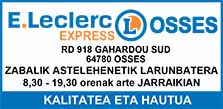Grace Wong/Inland Valley Daily Bulletin. The Basques are an indigenous ethnic group from an area between France and Spain near the Pyrenees mountains. With an endangered language and unique culture, there are less than 2.5 million Basque people left in the entire world, and only about 25 percent of Basques speak the language, which is in its own language family, according to the Center for Basque Studies at the University of Nevada, Reno. Because of this, members of the Basque community in Chino are attempting to document and emphasize the importance of their culture, racing to capture the memories and history of their community before the older generations die.
Begona Echeverria’s father was one of many Basque men who immigrated to Southern California in the ’50s and ’60s to pursue shepherding jobs.
Hotels, like the Centro Basco, served as a focal point for Basques to gather after a long day of working with sheep and provided an alternative to sleeping in tents.
For Bernadette Berterretche-Helton, daughter of the owner of Centro Basco, her education was provided by the many shepherds that came through the facility.
“My brother and I would sit together at the boarders table and there were two elders that we would sit next to and they would teach us all our table manners and how to finish what was on your plate and etiquette,” Berterretche-Helton said. “We really learned a lot growing up that way.”
As times changed, many Basque men transitioned from shepherding to working in the many dairies in Chino.
Despite the isolation of their work, the Basque community remained close-knit, Echeverria said. It is not uncommon for every Basque person to know every other Basque person or even be related.
The Chino Basque Club was established in 1968 and their annual picnics were the capstone event of the community with Basques traveling from all over Southern California to attend.
The culture was kept alive through speaking the language and the picnics that were kicked off with Mass, followed by lunch then an afternoon of traditional dance and song, and ending with dinner.
But Echeverria didn’t realize that her upbringing was rare until she attended college.
“I hadn’t really investigated it; it was just how I lived,” Echeverria said. “I guess I grew up pretty sheltered and its pretty unusual to have this community and even now, it continues to be very tight-knit and supportive. Basque people will show up and sing their hearts out.”
Echeverria became fascinated with the academia surrounding her culture and after years of research, she finally wrote a novel that touched on the many things she came across in her studies. The book, “The Hammer of Witches” was recently published by the Center for Basque Studies at the University of Nevada, Reno and is about the burning of Basque “witches” during the Spanish Inquisition.
Her book draws on traditional poetry and songs, any of which are still performed to this day.
“What I’ve done in the novel is that I’ve sprinkled the language throughout it and I have a glossary at the end,” Echeverria said. “My hope is that people will read it and be like, ‘Oh! I want to know more about them.’”
Echeverria isn’t the only one striving to preserve elements of Basque history and culture.
Mitch Gariador, 56 of Chino, and Marianna Etcheberria, 69 of Chino, have set out to document stories and experiences of the first generation of immigrants who left Basque country to come to the United States in search of employment. Their website, www.scbbgd.org is a treasure trove of live interviews, photos, documents, dates and many more. Their goal is to have records for each Basque immigrant who came to the United States and to preserve the memories of those still around.
“There’s a lot of appreciation right now for the history,” Gariador said. “To make sure we capture it before we lose too many more. We’ve lost too many already that we didnt capture their stories so it’s just gettign it out there in a place where people can access it and enjoy it.”
Through the website, Etcheberria said multiple people have found information about their ancestors, which inspired them to go to Basque country and see where their ancestors came from.
While the community is still fiercely proud of their heritage and culture, Berterretche-Helton said there has been a significant decrease in the number of Basque people still concentrated in one area.
“It’s all second generations now,” said Berterretche-Helton. “But what’s beautiful is that the kids all love it. It’s their roots and they want to keep it alive. When I see the young kids come in here and wanting to have dinner with their friends and family and introducing it to their non-Basque friends, it’s beautiful to see that they appreciate it and want to keep it alive and carry it on. My biggest fear was that they wouldn’t.”
As forks clang against plates and food is passed around the long table, the patrons chat with each other, some asking about the other’s family and others simply saying hello. Driving down Central Avenue, no one would ever guess that behind the two red doors of the Centro Basco, the Basque community is still thriving and evolving, eagerly bringing outsiders into their unique culture and language.



 Lagun bati bidali
Lagun bati bidali Komentarioa gehitu
Komentarioa gehitu








